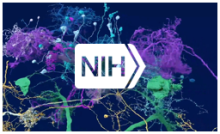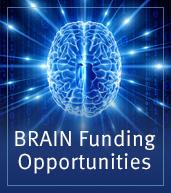
Requests for Applications (RFAs) for the NIH BRAIN Initiative® continue to address critical components of the BRAIN 2025 Report, including novel tools to explore brain microconnectivity and non-neuronal cells, technology integration and dissemination, neuroethics, non-invasive human brain imaging, invasive human neuroscience, and team-based research on neural systems and circuits.

For Fiscal Year (FY) 2018, NIH announces 11 notices of funding opportunities (NOFOs) for the BRAIN Initiative. Three new NOFOs call for the development of tools for facilitating high-throughput microconnectivity analysis, methods to characterize non-neuronal cells in the brain, and resource grants for technology integration and dissemination. Additionally, several FY17 NOFOs are being re-issued for research on ethical issues associated with advancements supported by the BRAIN Initiative, human brain imaging, various projects exploring neural circuits, invasive human neuroscience, and research fellowships for postdoctorates.
New NOFOs for FY18:
RFA-MH-18-505 Tools to Facilitate High-Throughput Microconnectivity Analysis (R01)
- This NOFO provides resources for development and validation of novel tools to facilitate the detailed analysis of brain microconnectivity. Primarily, this NOFO seeks to provide techniques and resources for examining complex circuits at the level of synaptic connections, alone or in combination with methods for identifying important cellular and circuit features. Technologies such as electron microscopy, nanoscale imaging, and newer methodologies including expansion microscopy and array tomography, as well as barcode-based tagging of synaptic connection may make it possible to map brain connectivity at the synapse resolution. The goal of this proposed effort is to produce next-generation, novel technologies for analysis of the microconnectome. Therefore, proposed methods should be transformative in scope and innovative in approach to studying molecular and cellular mechanisms of neural activity, particularly in analysis of micro- and macro-circuits. Plans to validate the tool/technology will also be essential. The application receipt date for this NOFO is December 7, 2017.
RFA-DA-18-018 Tools to target, identify and characterize non-neuronal cells in the brain (R01)
- This NOFO is designed to stimulate the development and validation of technologies, tools, and methods for a detailed inventory and analysis of non-neuronal cells within the brain and to understand their contribution to the function of neural circuits underlying complex behaviors. The unique properties of non-neuronal cells limit the usefulness and applicability of tools developed to study neurons, and sites of neuro-glio-vascular interactions can be difficult to isolate experimentally. This NOFO complements existing cell-census and tools development efforts initiated under RFA-MH-14-215 and RFA-MH-14-216 and is designed to develop new tools providing access to individual and defined groups of non-neuronal cells. Proposed tools or technologies should be transformative, high-risk, and aimed to overcome technical and analytical barriers to bridging experimental scales. Therefore, interdisciplinary collaborations such as with nanobiologists, computational and material scientists, and engineers are encouraged. The application receipt date for this NOFO is February 1, 2018; clinical trials are not allowed.
RFA-NS-18-005 Research Resource Grants for Technology Integration and Dissemination (U24)
- This U24 mechanism seeks to accelerate the scientific impact of the BRAIN Initiative by rapidly disseminating developed and validated technologies and resources to the broader neuroscience community. Proposed techniques, resources, or approaches should be at a well-validated stage wherein their value in research has already been demonstrated; proposals focused solely on development are not responsive to this NOFO. Representative examples of projects responsive to this NOFO include: a consortium for voltage sensors that detect changes in membrane potential, imaging services for large-scale recording or neural activity from multiple brain areas, and a resource that gathers and streamlines the distribution of transgenic mouse models for research. The application receipt date for this NOFO is February 9, 2018; clinical trials are not allowed.
NOFOs Re-issued for FY18:
RFA-MH-18-500 Research on the Ethical Implications of Advancements in Neurotechnology and Brain Science (Re-issue of MH-17-260; R01)
- This R01 mechanism provides opportunities to consider the integration of ethical issues with BRAIN-supported scientific advances, specifically research involving human subjects and resulting from emerging technologies and research advancements. Examples of application topics include those focusing on: risk analyses, consent issues, privacy, ethical implications of neuromodulation and neuroimaging technologies, and issues associated with predictive/diagnostic research. Individuals interested in applying are encouraged to contact the scientific co-leads to discuss application ideas. The application receipt date for this NOFO is December 7, 2017.
RFA-EB-17-005 Theories, Models and Methods for Analysis of Complex Data from the Brain (Re-issue of EB-15-006; R01)
- This RFA utilizes a R01 mechanism to solicit new theories, computational models, and statistical tools to derive understanding of brain function from complex neuroscience data. A variety of approaches are applicable: the creation of new theories, ideas, and conceptual frameworks to organize/unify data and infer general principles of brain function; new computational models to develop testable hypotheses and design/drive experiments; and new mathematical and statistical methods to support or refute a stated hypothesis about brain function, and/or assist in detecting dynamical features and patterns in complex brain data. NIH expects that the tools developed under this NOFO will be made widely available to the neuroscience research community. The application receipt dates for this NOFO are December 15, 2017, October 17, 2018, and October 17, 2019.
RFA-EB-17-003 Proof of Concept Development of Early Stage Next Generation Human Brain Imaging (Re-issue of EB-17-001; R01)
- This RFA uses a R01 mechanism to solicit unusually bold and potentially transformative approaches, including proof-of-concept development of brain imaging based on innovative and/or unconventional concepts aimed at revolutionizing the way non-invasive human neuroimaging is conducted. Tools and technologies can span a wide array of approaches including hardware, software, or imaging probes addressing any of the steps of the image acquisition and analysis process. Creative efforts to bridge scales from the micro- to meso- to macro-level in the brain are especially encouraged. The application receipt dates for this NOFO are December 20, 2017 and December 11, 2018.
RFA-EB-17-004 Development of Next Generation Human Brain Imaging Tools and Technologies (Re-issue of EB-17-002; U01)
- This RFA uses an U01 mechanism to support the full-scale development of novel imaging technologies beyond the proof of concept stage for noninvasive imaging of human brain processes in ways that are currently unachievable in healthy persons. NIH expects successful projects supported under the previous RFAs to be the basis for some of the applications submitted in response to this announcement, but previous support is not a requirement. This NOFO supports an open competition for the best ideas for the full development of innovative and compelling new or next-gen non-invasive brain imaging technologies, with the intent of delivering working tools within the time frame of the BRAIN Initiative. The application receipt dates for this NOFO are December 20, 2017 and December 11, 2018.
RFA-NS-18-008 Exploratory Team-Research BRAIN Circuit Programs – eTeamBCP (Re-issue of NS-15-005; U01)
- This RFA uses an U01 mechanism and is part of a family of “Integrated Approaches” NIH BRAIN NOFOs. This NOFO promotes the integration of experimental, analytic, and theoretical capabilities for the large-scale analyses of neural systems and circuits, through interdisciplinary teams of experts who plan to conduct exploratory studies. These studies should incorporate information on cell-types and circuit function/connectivity, and be performed alongside analyses of complex, ethologically relevant behaviors. Successful exploratory studies should lead to subsequent competing applications for team-based research projects. The application receipt date for this NOFO is December 15, 2017.
RFA-NS-18-009 Targeted BRAIN Circuits Projects – TargetedBCP (Re-issue of NS-17-014; R01)
- This RFA uses a R01 mechanism and is part of a family of “Integrated Approaches” NIH BRAIN NOFOs. The primary goal of this NOFO is to solicit research projects using innovative, methodologically-integrated approaches to understand how circuit activity gives rise to mental experience and behavior. This RFA may support individual laboratories or small multi-PD/PI groups, and applications should offer specific, feasible research goals as endpoints to understand brain circuit function at cellular and sub-second levels of resolution in ethologically relevant behaviors within a 5-year term. The application receipt dates for this NOFO are December 8, 2017 and March 15, 2018.
RFA-NS-18-010 Exploratory Research Opportunities Using Invasive Neural Recording and Stimulating Technologies in the Human Brain (Re-issue of NS-17-019; U01)
- This RFA uses an U01 mechanism and addresses the BRAIN 2025 Report recommendation to “Advance Human Neuroscience.” This NOFO seeks applications to assemble integrated, multi-disciplinary teams to tackle barriers inherent to human studies using invasive technologies and experimental protocols via exploratory research and planning activities to establish feasibility, proof-of-principle, and early stage development studies that might later compete for continued BRAIN Initiative funding. Successful projects will maximize opportunities to conduct innovative neuroscience research from invasive surgical procedures, and may incorporate methods of temporally-linked brain-behavior quantification. Note that awardees are expected to join a consortium work group to identify data standards and aggregate data for broad dissemination. The application receipt date for this NOFO is January 19, 2018.
RFA-MH-18-510 BRAIN Initiative Fellows: Ruth L. Kirschstein National Research Service Award (NRSA) Individual Postdoctoral Fellowship (Re-issue of MH-17-250; F32)
- The purpose of the BRAIN Initiative Fellows (F32) program is to enhance the research training of promising postdoctorates, early in their postdoctoral training period, who have the potential to become productive investigators in research areas that will advance the goals of the BRAIN Initiative. Applications are encouraged in any research area that is aligned with the BRAIN Initiative, including neuroethics. Applicants are expected to propose research training in an area that clearly complements their predoctoral research. Formal training in analytical tools appropriate for the proposed research is expected to be an integral component of the proposed research training plan. In order to maximize the training potential of the F32 award, this program encourages applications from individuals who have not yet completed their terminal doctoral degree and who expect to do so within 12 months of the application due date. On the application due date, candidates may not have completed more than 12 months of postdoctoral training. The application receipt dates for this NOFO are: March 15, 2018; December 7, 2018; August 7, 2019; April 7, 2020.
Please visit our Active Funding Opportunities page for more details on these and other RFAs for the BRAIN Initiative.
